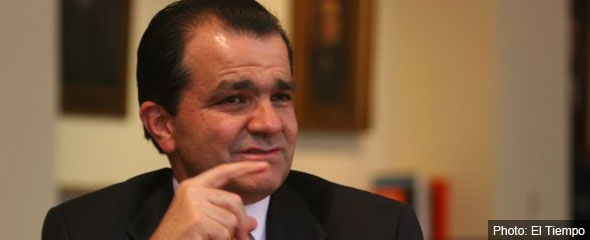
Colombia is not considering capital controls to limit appreciation of its currency, its finance minister said on Saturday, even though the measures are no longer seen as taboo by many other nations.
Finance Minister Oscar Ivan Zuluaga, speaking on the sidelines of the International Monetary Fund/World Bank spring meetings, said he was “surprised” by the high level of discussion among member countries.
He said Colombia successfully used capital controls to limit the appreciation of its currency, the peso, in 2007.
“So we are not considering that. What I say is that I see many countries with positive views in that respect,” Zuluaga told Reuters in an interview.
“I am very surprised with the popularity of capital controls discussion at the IMF meeting. Many countries and governments now are in a more open position to see and to discuss because the liquidity on the international markets could produce additional pressures on a short-term basis,” he said.
The IMF in February did an about-face on capital controls, saying they were a way to curb sudden surges in money flowing into emerging market economies – a shift in its long-held view that capital controls are ineffective.
Officials at the finance meetings in Washington over the weekend flagged the problem of flows into emerging economies.
IMF head Dominique Strauss-Khan put it more bluntly when he told a press conference on Thursday: “There are huge capital inflows going into emerging countries, creating [the] risk of asset price bubbles.”
But Zuluaga said Colombia, Latin America’s No. 4 oil producer, did not have a short-term capital problem.
“Fortunately we don’t have short-term capital presence in Colombia. We have FDI (foreign direct investment) which is long-term capital inflows for the economy. So we are not considering that,” he added.
Colombia’s peso has risen roughly 4.3% so far this year against the U.S. dollar, buoyed in part by investors seeking higher yields in Latin America.
VENEZUELA DISPUTE
Zuluaga said Colombia was struggling with the loss of Venezuela as a key trading partner.
Venezuela and Colombia are locked in a trade and diplomatic quarrel over Bogota’s decision to allow U.S. troops more access to its military bases to counter FARC rebels and cocaine traffickers.
Colombia is one of the strongest U.S. allies in Latin America, while Venezuela, led by socialist President Hugo Chavez, is a foe of the United States.
Chavez has called the bases plan an aggression against his OPEC-member nation.
The dispute has battered trade between the two countries, with Chavez ordering a halt on Colombian imports. Colombia says the trade conflict could trim around 1% off its economic growth this year.
“We believe that we have learned a lesson and we cannot depend as much as we did in the past with Venezuela,” he said.
“The main reason for this year’s differences is the Asian exports. When you consider Peru, Chile, Brazil, on average they export 30% to Asia. In the case of Colombia it’s less than 5%. So that is the main difference,” he said.
Zuluaga, who will leave the government after the upcoming presidential election in May, reiterated that he expects the economy to grow 2.5% this year. (Reuters)

